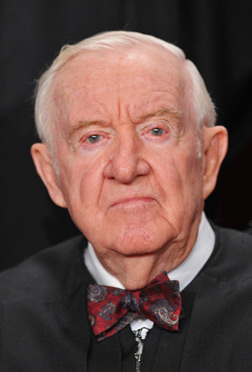Today’s announcement that Supreme Court Justice John Paul Stevens will retire can hardly be labelled a surprise (Stevens will soon turn 90, and has served on the court for more than three decades). But since the Supreme Court often decides cases which are entangled with questions of profound moral depth, any change in the court’s make-up is an occasion for careful scrutiny and widespread anticipation.
Stevens is generally considered the most reliably “liberal” justice on the Court. He was not yet on the court when Roe v. Wade legalized abortion, but during his 34-year tenure he has been an influential voice in support of that precedent on the most neuralgic issue for religious conservatives.
But Stevens’ retirement is of religious interest for another reason. When he steps down, it will be the first time in U.S. history that no Protestant is serving on the Court. National Public Radio recently (and in advance of the Stevens announcement) ran a story about this phenomenon. Before that, Slate.com raised some of the same points.
No doubt the six-justice Catholic majority on today’s court would alarm many of the founding fathers — perhaps even more than the presence of two Jewish justices. Strictly speaking, of course, religion cannot be used as a criterion in selection of judges. Article VI of the U.S. Constitution ruled out religious tests for service in public office, even before the First Amendment barred government meddling for or against religion. But the retirement of the only Protestant justice on the court is a milestone worth noting.
It is possible that the next appointee will fill the Protestant void, with or without a religious test. There are presumably still a few qualified Protestants out there, even ones who will fit the profile sought by President Obama. And religious SCOTUS observers might conclude that the church affiliation of justices is entirely beside the point.
The impact of Protestantism on the shape and practice of civil law is an interesting business, and more complex than you might guess. If you’re seriously curious, you should consult, for starters, John Witte’s excellent book, Law and Protestantism: the Legal Teachings of the Lutheran Reformation. And then you can move on to The Supreme Court and Religion in American Life (2 volumes) by James Hitchcock.
I’m still uncertain whether it matters or not that we have a Protestant on the court. The Catholic justices have, for the most part, a strongly developed understanding of natural law and moral order, and the same cannot be said of many Protestants. And that may be more important for the work the Supreme Court does than preserving a vestige of America’s Protestant cultural “establishment.”


Leave a Reply
You must be logged in to post a comment.